Written by Sophia Wynning of Delightfully Noted
According to recent studies, the global countertop market size stood at USD 89.18 billion and is projected to reach USD 110.54 billion by 2027, exhibiting a CAGR of 2.8% during the forecast period.
The kitchen, often dubbed the heart of a home, is undergoing a green revolution. Eco-friendly countertops are a trend and a testament to a global shift toward sustainable living.
Homes are being reimagined with sustainability at the core, and our kitchens are leading this charge. These countertops, a blend of aesthetics and environmental responsibility, underscore that the two aren’t mutually exclusive. Let’s explore sustainable kitchen design, where eco-friendly countertops are both a symbol and a solution.
Understanding Eco-Friendly Materials
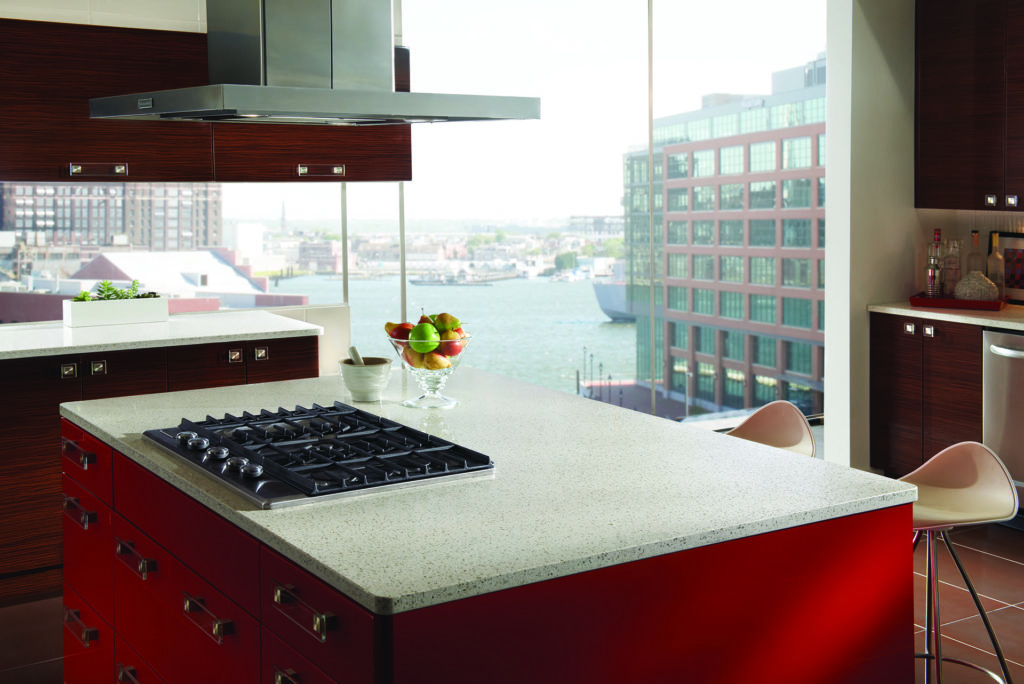
Eco-friendly materials are gaining ground in today’s conscientious world. These materials prioritize environmental protection, reducing the strain on our planet’s resources. They follow a sustainable life cycle from production to disposal, ensuring minimal environmental harm. Their rise marks a shift in industry standards, emphasizing that longevity and low impact coexist. By understanding these materials, we move closer to a sustainable future.
- What Makes A Material “Eco-Friendly”?
When it comes to defining “eco-friendly” materials, several factors come into play:
- Source Sustainability:
The origin of a material determines its green quotient. Eco-friendly materials often derive from renewable or recycled sources, ensuring we don’t deplete our planet’s finite resources.
- Low Environmental Impact:
These materials are produced, used, and disposed of with minimal environmental harm. This includes reduced energy consumption and decreased waste.
- Durability:
Eco-friendly doesn’t just mean sourced sustainably; it also refers to longevity. Materials that last longer reduce the need for frequent replacements, thus conserving resources in the long run.
- Safe Production:
Creating these materials lacks harmful chemicals or pollutants that can damage our ecosystem.
Integrating eco-friendly materials is a natural progression for those diving deep into sustainable living. Whether revamping your home or exploring kitchen design online, it’s pivotal to understand and prioritize these materials. The choice reflects an aesthetic appeal and a commitment to a greener planet.
- The Environmental Impact Of Traditional Countertop Materials:
Traditional countertop materials, like granite and marble, require extensive mining. This results in habitat destruction and landscape alteration. Moreover, as these are finite resources, over-extraction could lead to eventual depletion.
- Energy-Intensive Production:
Materials such as quartz involve an energy-consuming manufacturing process. High temperatures and machinery operations contribute significantly to carbon footprints.
- Transport and Emissions:
These traditional stones are often sourced from distant locations, necessitating long transportation routes. This increases greenhouse gas emissions due to the extensive use of heavy machinery and vehicles.
- Waste Production:
The cutting and shaping of these materials generate substantial waste. While some can be recycled, a large percentage ends up in landfills.
Knowing these environmental impacts helps homeowners make informed decisions as sustainability becomes a household term. It’s an era of awareness where understanding the backdrop of our choices, especially in kitchen design, is crucial.
Top Eco-Friendly Countertop Options
In sustainable home design, eco-friendly countertops are emerging as champions. These countertops are reshaping modern kitchens by prioritizing aesthetics and environmental responsibility.
As the demand for green alternatives soars, several sustainable materials are stepping into the limelight. From recycled glass to bamboo, the range is vast and impressive. Let’s dive into the top eco-friendly countertop options, seamlessly merging style with sustainability.
- Recycled Glass Countertops:
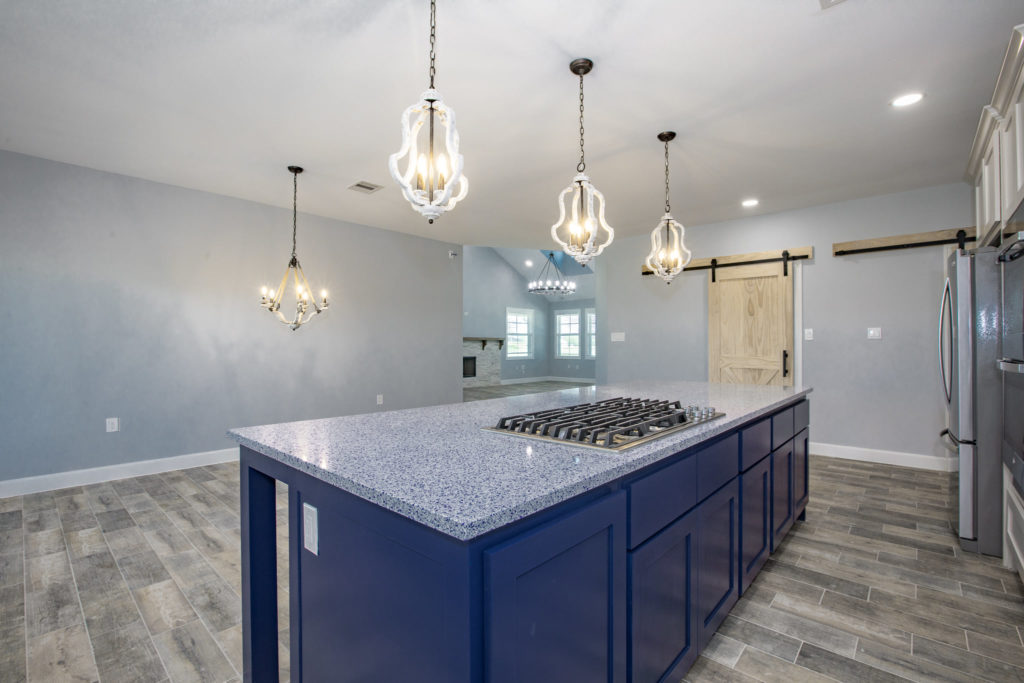
One of recycled glass countertops’ standout features is their sustainability foundation. These countertops, made primarily from post-consumer glass, give discarded bottles and jars a second life.
- Aesthetic Brilliance:
Beyond their green credentials, these countertops offer a mosaic-like visual appeal. The embedded glass fragments catch and reflect light, bringing a unique sparkle to the kitchen.
- Durability:
Contrary to what one might assume, recycled glass countertops are remarkably sturdy. Properly sealed, they resist heat, stains, and scratches, making them suitable for rigorous kitchen activities.
- Low Maintenance:
With non-porous surfaces, these countertops don’t readily harbor bacteria or mold, simplifying the cleaning process.
Incorporating these countertops can uplift your kitchen’s aesthetic while championing environmental causes. For a deeper exploration and an addition to your space, delve into recycled glass countertops and witness the blend of beauty and responsibility.
- Natural Stone and Sustainable Alternatives:
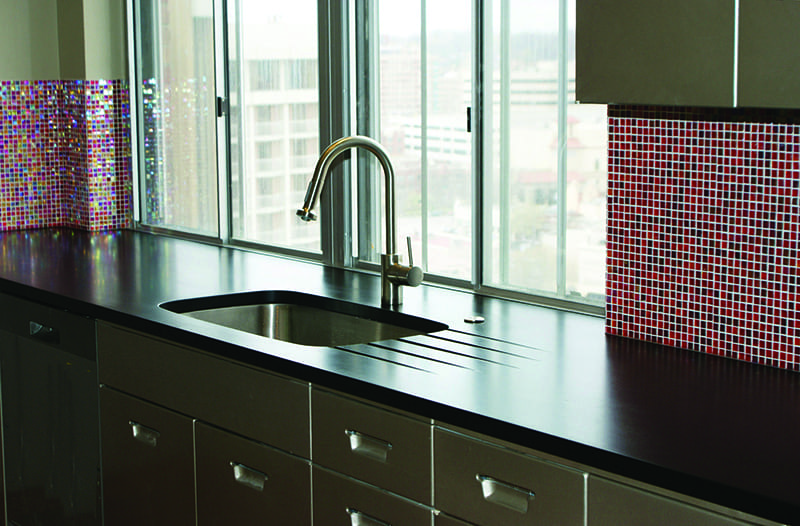
Materials like granite, marble, and slate have graced kitchens for decades. Their natural beauty and durability make them perennial favorites. However, their extraction can strain the environment.
- Eco-Alterations:
Some manufacturers have risen to the challenge, offering more eco-friendly versions of these stones using sustainable quarrying techniques or reducing transportation footprints.
- Innovative Contenders:
Materials like PaperStone or IceStone integrate recycled components, offering the durability of stone but with a reduced environmental impact. They combine natural elements, like recycled paper or glass, with sustainable resins.
- Function Meets Green Design:
These alternatives don’t compromise on function. Resistant to heat, stains, and other kitchen challenges, they stand toe-to-toe with traditional stone choices.
Exploring natural stone and its sustainable counterparts presents a spectrum of options. Homeowners can now enjoy the grandeur of stone while upholding their commitment to the environment.
Benefits of Choosing Sustainable Countertops
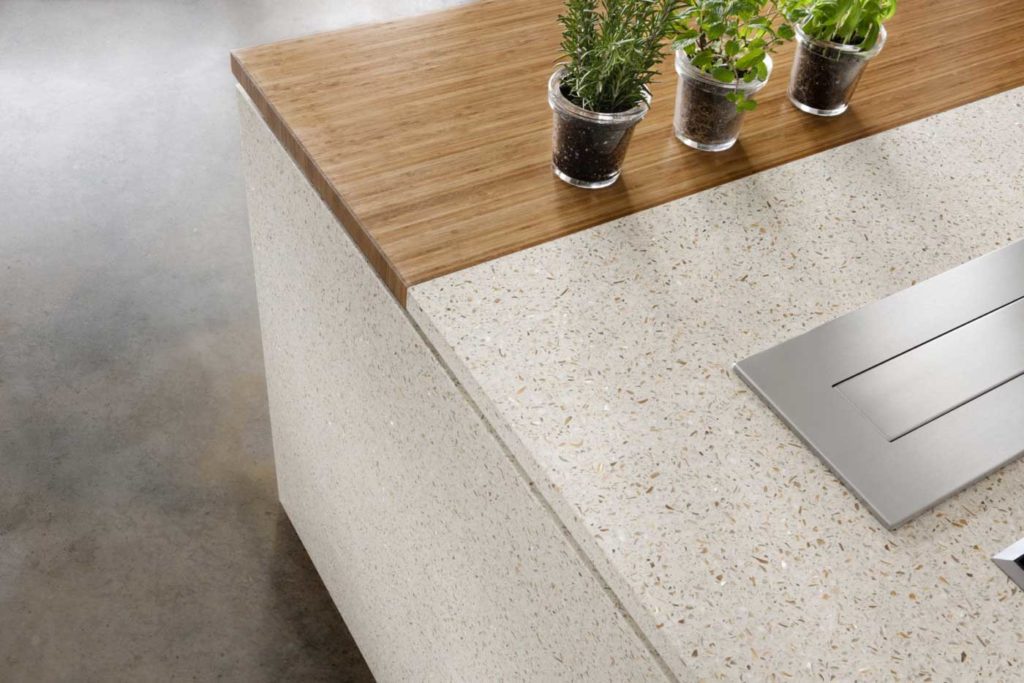
Sustainable countertops are more than just a trendy choice; they represent a commitment to the environment and smarter investment in your home. Homeowners reduce their carbon footprint by opting for these eco-friendly surfaces and enjoy durable, stylish, and often cost-effective solutions.
Let’s explore their multifaceted advantages for our planet and your living space.
- Environmental Benefits:
Sustainable practices often prioritize the use of recycled or rapidly renewable materials. This means fewer virgin resources are extracted, leading to decreased environmental disruption and habitat loss.
- Lower Carbon Emissions:
The production of many sustainable countertops emits fewer greenhouse gasses than traditional counterparts. This contributes to a significant reduction in your home’s overall carbon footprint.
- Decreased Landfill Waste:
Countertops made from recycled or reclaimed materials give new life to otherwise discarded items. This saves valuable space in our already overstretched landfills and reduces the energy and emissions associated with waste processing.
- Conservation of Water:
Sustainable countertop manufacturing often involves water-saving techniques. Choosing these surfaces can contribute to global water conservation efforts in an era where every drop counts.
By embracing environmentally-friendly countertops, you’re making a clear statement about the future you want—a planet that thrives for generations to come.
- Health and Safety Advantages:
Sustainable countertops are often made without harmful chemicals or volatile organic compounds (VOCs). This ensures the air in your home remains clean and free from potential irritants or toxins.
- Anti-Microbial Properties:
Certain eco-friendly surfaces have inherent anti-microbial properties. This reduces the risk of bacterial growth, making your kitchen and bathroom safer and more hygienic.
- Durability and Resistance:
Eco-conscious countertops are designed for longevity. Many resist chipping, scratching, and heat, minimizing the risk of accidents and ensuring a safer environment in high-traffic areas.
- Improved Indoor Air Quality:
Homeowners can breathe easier by choosing sustainable materials that don’t off-gas harmful chemicals, knowing their indoor air quality is uncompromised.
Making the switch to sustainable countertops isn’t just an environmental decision. It’s a conscious choice for a healthier, safer living space for you and your loved ones.
- Longevity and Durability:
Sustainable countertops are crafted to withstand daily use. Whether it’s the hustle of meal prep or regular cleaning, these surfaces can take it all without showing early signs of wear.
- Cost-effective in the Long Run:
The initial investment might be higher for some sustainable options, but their lasting power means fewer replacements over time. This longevity can lead to significant savings in the long run.
- Less Maintenance:
Many eco-friendly countertop materials require minimal upkeep. They don’t easily stain, chip, or crack, which reduces the time and resources needed for maintenance.
- Timeless Appeal:
Not only are these countertops built to last, but their designs often possess a timeless quality. These surfaces remain stylish as trends come and go, ensuring your space stays current and appealing.
Incorporating sustainable countertops into your home is a testament to quality and endurance, guaranteeing a blend of function and aesthetic appeal for years.
- Aesthetic Appeal and Design Versatility:
Sustainable countertops come in many colors, textures, and patterns, allowing homeowners to find the perfect match for their interior themes, from rustic to modern.
- Natural Beauty:
Many eco-friendly options showcase the raw allure of their materials, be it reclaimed wood’s grain or recycled glass’s shimmer, adding a unique charm to spaces.
- Customization:
Given the flexible nature of sustainable materials, they can be tailored to suit specific design requirements, ensuring that every countertop is as unique as the homeowner’s vision.
- Harmony with Nature:
There’s an undeniable serenity in bringing elements inspired by nature into the home. Sustainable countertops seamlessly bridge the gap between indoor spaces and the natural world, creating a cohesive and tranquil environment.
Choosing sustainable countertops means maintaining style. Their aesthetic appeal and versatility ensure your space is environmentally conscious and undeniably chic.
Installation and Maintenance
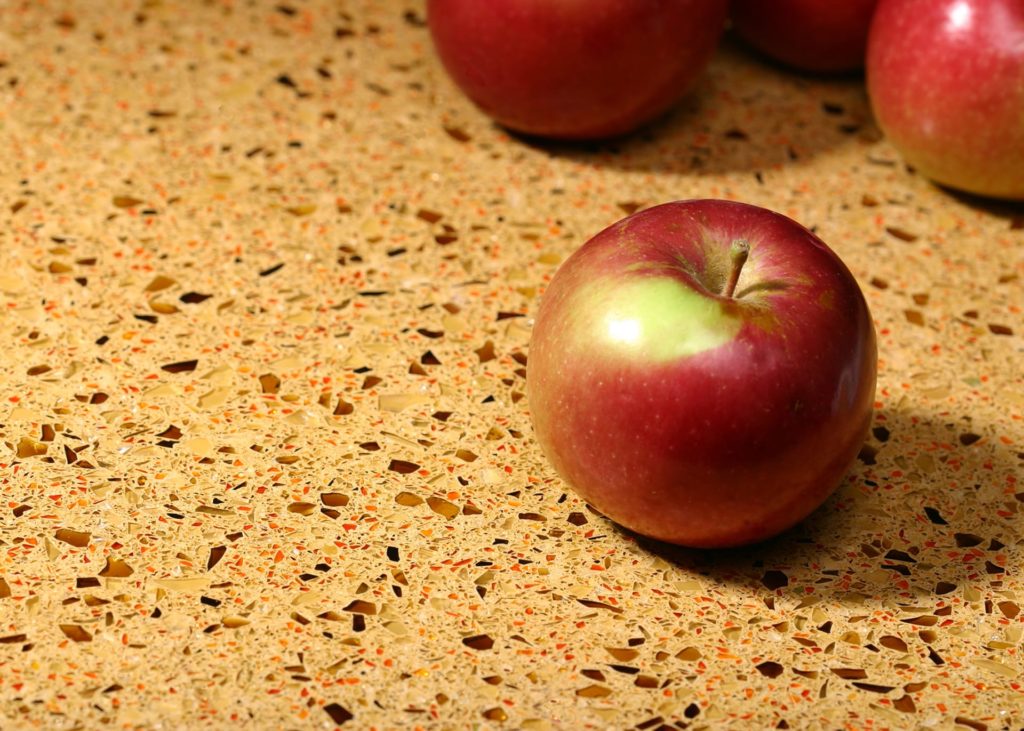
A smooth installation ensures a seamless fit and finish, while easy maintenance keeps your surfaces pristine for years. Dive into the intricacies, understanding how they impact your chosen countertop’s overall functionality and lifespan and why they’re pivotal for an enduring, beautiful space.
- Best Practices for Eco-Friendly Countertop Installation:
Ensure your countertop materials are responsibly sourced. Opt for suppliers who use recycled or sustainably harvested materials, promoting environmental stewardship.
- Minimize Waste:
During the measurement and cutting phase, reduce waste precisely. Any offcuts can be saved for smaller projects or responsibly recycled.
- Safe Adhesives:
Choose low-VOC or VOC-free adhesives. These safeguard indoor air quality and reduce environmental impact during production.
- Local Craftspeople:
Hiring local artisans and installers reduces transportation emissions by bringing in a distant team. Local experts often have insights into regional sustainable materials.
- Recycle Old Countertops:
Instead of sending your old countertop to a landfill, consider recycling or upcycling options. This could mean repurposing it in another part of your home or donating to a local charity.
Opting for an eco-friendly countertop installation is a holistic approach, encompassing the materials you choose, the methods employed, and the future lifecycle of the product.
- Tips for Maintaining and Prolonging the Life of Sustainable Surfaces:
Use mild, eco-friendly cleansers and a soft cloth to clean your countertop. Avoid abrasive pads, which can scratch or damage the surface.
- Immediate Spill Management:
Act promptly when spills occur. Acidic substances like lemon juice or vinegar can stain or etch certain surfaces, so wipe them up immediately.
- Use Protective Measures:
Place trivets under hot pots or pans to prevent heat damage. Consider using cutting boards to prevent scratches, even if the material claims to be scratch-resistant.
- Sealing Practices:
An eco-friendly sealer is recommended for porous materials like natural stones or recycled paper countertops. This protects against stains and moisture.
- Regular Inspection:
Periodically inspect for chips, cracks, or other damage. Early detection means you can address minor issues before they become more prominent and challenging.
By diligently caring for your sustainable countertops, you preserve their beauty and extend their lifespan, enhancing their eco-friendly nature.
Cost Implications

Sustainable countertops inevitably bring the question of cost to the forefront. The initial investments might vary, but understanding these choices’ broader financial landscape is crucial.
Beyond the price tag, one must consider longevity, maintenance savings, and potential home value boosts. The true cost implications of sustainable countertops, looking beyond just dollars and cents to long-term value and impact.
- Initial Investment vs. Long-Term Savings:
The material and source of sustainable countertops have a higher initial price than traditional options. Factors like production methods, material rarity, and transportation can influence this cost.
- Durability Dividends:
The robust nature of many sustainable materials means fewer replacements or repairs. You might spend more initially, but longevity offers savings in the long run.
- Maintenance Matters:
Eco-friendly surfaces demand less intensive care, translating to fewer maintenance expenses. Think fewer sealants, less frequent professional polishing, or reduced cleaning product costs.
- Energy Efficiency:
Sustainable countertops contribute to better home insulation, potentially reducing energy bills by maintaining indoor temperatures.
- Home Value Boost:
Homes with sustainable features can attract higher market values. As eco-awareness grows, these countertops become a coveted home feature, offering a return on investment during resale.
- Comparing Eco-Friendly Options with Traditional Materials:
Eco-friendly countertops often have a smaller carbon footprint due to sustainable sourcing, production, and transportation. Unless responsibly sourced, traditional materials might involve resource-intensive extraction and manufacturing processes.
- Aesthetic Diversity:
Traditional materials like granite or marble have a classic appeal, and sustainable options offer unique textures, colors, and stories—from reclaimed wood to recycled glass, presenting a broader design palette.
- Durability and Maintenance:
Sustainable materials boast impressive longevity with minimal upkeep. Traditional stones, while durable, may require regular sealing or specific care to avoid stains or etching.
- Cost Analysis:
Some eco-friendly options might have a higher initial cost, but their extended lifespan and reduced maintenance often offset this. Traditional materials can vary in price but might incur higher long-term maintenance costs.
- Health Implications:
Eco-friendly surfaces typically use fewer toxins and chemicals, ensuring better indoor air quality compared to some traditional materials.
While both choices have their merits, sustainable options often align more closely with modern-day environmental and health priorities.
Conclusion
Eco-friendly countertops are a testament to the marriage of sustainability and aesthetics in contemporary kitchen design. Understanding what qualifies material as eco-friendly primarily hinges on its environmental impact, especially when contrasted with traditional countertop materials.
Among the most commendable options, recycled glass countertops, and sustainable natural stone alternatives have emerged as frontrunners. Beyond the obvious environmental benefits, countertops offer significant health and safety perks. Notably, they are often free from harmful chemicals, thus promoting a healthier indoor environment.
Many of these sustainable choices offer impressive longevity and durability, ensuring homeowners aren’t sacrificing function for form. Their design versatility further cements their appeal in modern homes.
When it comes to installation and maintenance, adopting best practices is crucial for maximizing the lifespan of these surfaces. This can also optimize the return on investment, which brings us to cost implications.
The initial outlay for eco-friendly countertops may be higher than traditional materials, but the long-term savings, both monetary and environmental, render them a wise investment. Sustainable countertops aren’t just a trend but a conscious choice for a greener, healthier, and more stylish kitchen.
